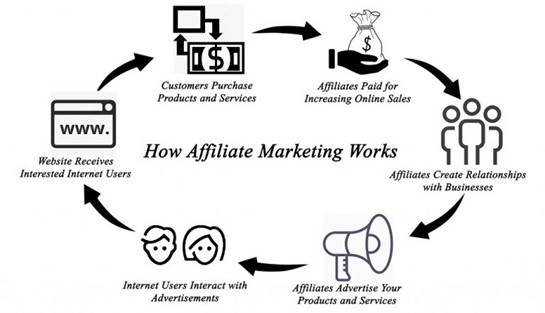Affiliate marketing has come a long way since its humble beginnings. Once a modest marketing tool, it has now evolved into an excellent asset for both parties involved. It has become a means for marketers, content creators, and influencers to earn revenue and for brands and businesses to increase sales.
Not all industries are equally positioned to take advantage of it, however. Healthcare affiliate marketing may seem more daunting than most, whether you’re a healthcare professional seeking promotion or an affiliate seeking to promote.
If you’re looking into this subject through articles like this one, chances are you agree. If so, here we’ve consolidated affiliate marketing ideas for healthcare you may consider.
What is affiliate marketing?
Having used the term “affiliate” already, let us first briefly clarify how affiliate marketing works. You may skip this section if you’re already familiar with it.
Affiliate marketing typically includes two parties, with an optional third for convenience:
- Merchants, or “brands”; the brands, businesses, or professionals seeking to promote their offerings;
- Affiliates, or “publishers”; the creators, marketers, or other individuals who can carry out product or service promotions;
- Affiliate networks; the platforms that offer to bring merchants and affiliates together, like Amazon’s Associates.
The way affiliate marketing works is simple enough. Affiliates promote the products or services of merchants through affiliate links.
For every successful sale, affiliates get a commission fee from merchants. And merchants get more sales than they would without affiliate marketing.
If you’ve been on the internet for long enough, chances are you’ve seen affiliate marketing in practice. You may have noticed, for instance, blog posts or other written content with a disclaimer like this:
“Please keep in mind that we may receive a commission when you click on our links and make a purchase. This, however, has no bearing on our [content goals].”
Or, you may have seen YouTubers promote limited offers and coupons or offer links to their equipment. This should also typically feature an affiliate link disclosure, like “note: affiliate link included”.
While the latter doesn’t explicitly describe what affiliate marketing is, the former does – it really is that simple.

Why is affiliate marketing worth considering?
Now, before discussing healthcare affiliate marketing in particular, let us briefly discuss why affiliate marketing is worth your consideration. Again, if you’re familiar with these fundamentals, you can skip to the later sections.
In brief, affiliate marketing is very much worth your time – whether you’re a merchant or affiliate. Its popularity should speak for itself, as statistics show:
- Affiliate marketing has a market value of $17 billion as of 2022
- 80% of brands run an affiliate marketing program
- Affiliate marketing is used by 83% of marketers to raise brand recognition
If popularity alone does not suffice, its sheer efficiency might:
- 16% of online orders in the United States come through affiliate marketing
- Affiliate marketing drives 5% to 30% of the internet revenue of some of the best-performing businesses in the world
- Affiliate marketing conversion rate averages between 0.5% to 1%
As you can see, affiliate marketing is very much worth its reputation. It benefits both parties involved and comes with few risks beyond traditional marketing uncertainties and challenges.
The thriving healthcare affiliate marketing landscape
Finally, as far as introductions go, the healthcare industry is indeed ripe for affiliate marketing. Depending on whether you’re a merchant or an affiliate, there are different reasons for this.
If you’re a healthcare professional, chances are you’ve faced marketing woes before. The industry has many inherent limitations, from what marketers dub an “unexciting” subject to local laws and regulations.
That healthcare marketing addresses specific needs certainly helps. However, that marketing diversification is more demanding than in most industries. Furthermore, the global pandemic limiting in-person interactions was another significant challenge the industry took note of. And its implications remain even today.
Finally, many healthcare websites are still not entirely aligned with Search Engine Optimization (SEO). When “93% of online experiences begin with a search engine”, as WebFX puts it, this can notably lower your final revenue – unless you employ affiliate marketing to improve your chances.
If you’re an affiliate, you can initially note the industry’s growing need for this practice, as highlighted above. When most affiliates are starting to struggle to find their niche, this may be an opportunity for you.
In addition, you should note that the global wellness industry, in which healthcare is a central pillar, is massive. In numbers, it’s worth approximately $4.5 trillion – and it increasingly leans on marketing to expand.
On that note, your existing audience may already have an affinity for general wellness products and services. Healthcare marketing isn’t just about promoting hyper-specific medical equipment or treatments but a range of wellness offerings.

Affiliate marketing ideas for healthcare; products, channels, and networks
To elaborate on this final point, let us now delve into healthcare affiliate marketing ideas. Consider the following in no particular order, depending on your position, needs, and needs.
#1 Healthcare products
First things first, “healthcare products” might best be defined as broader wellness products – including traditional, strictly healthcare-related products. You may need to expand your scope depending on what you’re seeking to promote and what resonates with your audience.
For some examples, consider some main product categories under this umbrella.
Healthcare equipment and healthcare machines
Aside from direct drug sales, these are perhaps the most traditional healthcare products. Healthcare equipment and machines are typically sold to hospitals, other healthcare establishments, and individual healthcare practitioners.
In such cases, you’ll typically need to adopt a business-to-business (B2B) model. These don’t cater to general audiences, after all, but specialized, knowledgeable professionals looking for information, not emotional appeals.
Concierge medical services
Similarly, concierge medical services are still on the traditional side of healthcare marketing. As regards the service promoted, this type of healthcare is distinctly new and digital.
If you’re an aspiring affiliate, you should note that this service is quite robust and future-proof. The advent of telehealth across the globe, especially post-pandemic, has opened up a market embraced by both doctors and patients.
If you’re a concierge doctor yourself, you most likely know the sheer value of affiliate marketing toward promoting such services. Most concierge doctors are already members of physician networks that leverage this marketing practice, so you likely don’t need our encouragement.

Health insurance
If you’re looking for affiliate marketing ideas for healthcare, you might not have immediately suspected that health insurance falls under this same umbrella. It absolutely does, however, and you may best not let the challenges of selling any insurance discourage you.
Granted, this type of niche typically has insurers approach healthcare practitioners. Still, if you’re reputable in your field and your audience resonates with this offering, you may become a successful affiliate.
Health gadgets
Health gadgets continue the theme of telehealth and telemedicine. These may also illustrate the overlap between traditional health and wellness products.
This category might include location devices for dementia patients, for a more specific example. Functionally and more broadly, this category might even have scheduler apps or tracker gadgets which remind patients to take medicine.
However, if you google the term “health gadgets”, you’re much more likely to find wellness gadgets. Fitbit may be a notable example of this, but it’s far from the only fitness-minded gadget of its kind.
Under this lens, healthcare affiliate marketing offers vast opportunities for affiliates. Audiences invested in healthcare are often also invested in fitness and wellbeing, which can present tremendous opportunities.
Probiotics and dietary supplements
In much the same way, and having moved to a business-to-consumer (B2C) approach, this category also pronounces this overlap. Audience keen on health and healthcare is also often invested in proper wellbeing, making them potential customers for probiotics and dietary supplements.
With this in mind, it should not surprise you that Physician’s Choice is among the most notable health affiliate programs. The brand’s probiotics have a vast audience, and that they work closely with the FDA and physicians only adds to customer trust.

Perhaps unsurprisingly, this same audience also has an affinity for dietary supplements – most notably vitamins. Depending on how enthusiastic some subgroups are about exercise and fitness, protein and creatine supplements may not be out of the question either.
Healthy foods
Adjacent to the above are healthy foods, and they, too, share audiences with typical healthcare products. From patients with specific dietary needs to fitness enthusiasts being proactive about their health, affiliates have wide options here.
To illustrate this, and also give you some merchants to look into, consider some reputable health food brands:
- Thrive Market
- Kalyx
- Vitacost
- Sunfood Superfoods
- Natural Zing
You’ll soon see this same overlap if you explore these brands’ offerings. If you’re an aspiring affiliate, this likely already inspires some affiliate marketing ideas for healthcare and beyond.
Most of them offer healthy foods alongside supplements and shelf-stable items. Some branch out more or dig deeper into superfoods, homeopathic items, and even beauty products.
For affiliates, this practically means more opportunities to promote specific products among these, focusing on their niche. Say, a dietician may promote superfoods, a trainer may promote supplements, and a beauty influencer may promote beauty products – all under the same brand.
Exercise and rehabilitation equipment
Yet another flexible product category, exercise equipment, continues the above trend. Recovery equipment may cater to physicians and recovery centers, while exercise equipment may cater to fitness enthusiasts.
Lists of such products can be endless, but here we may briefly outline some notable ones:
- Treadmills
- Recumbent and upright bikes
- Pulleys
- Steppers
- Benches
- Arm and legs ergometers
- Plyometric rebounders
- Strength exercise equipment
If this seems like a diverse product selection, it’s because it is. Healthcare affiliate marketing does not exclusively cater to patients, nor has it completely swayed to fitness enthusiasts – it addresses both.

This does mean that affiliates may not be fit to promote all products in this category. That’s its perk; diverse offerings present more opportunities to find the perfect match for your niche.
General wellness products
Finally, general wellness products. This broad category is where the initial focus on healthcare begins to wane, and a shift to broader wellness occurs.
For some examples that illustrate this, consider products like:
- Water ionizers
- Ergonomic or anti-snoring mattresses
- CBD oils and products
- Exercise and everyday clothes
- Essential oils
This range of wellness-minded products offers excellent versatility for affiliates, but it does somewhat stretch the “healthcare” term. Still, if such products fit your niche and audience, they may serve as your affiliate marketing focus.
#2 Affiliate marketing channels
Now, you may not yet have an established channel through which to become an affiliate. You may have an interest in healthcare affiliate marketing in particular but have not yet pinpointed the platform to become an affiliate through.
Admittedly, this vast subject would require its article to cover thoroughly. Still, here we may cover the basics and give you some ideas to look into at your leisure.
The three main channels to approach affiliate marketing are, arguably, the following.
Blogs and websites
Most types of blogs have a dedicated subject matter and delve into a specific niche. If yours is in any way relevant to healthcare, fitness, or wellbeing, it may already be an excellent fit for affiliate marketing in this field.

Websites themselves typically follow this motif too. Even if they don’t have a dedicated blog section, which is becoming increasingly rare nowadays, they can also suffice.
How they can do so, outside of blogs, will vary quite a bit. Channels in this area can include:
- Email newsletters
- Resource pages
- Online courses
- Instructional and how-to videos
However, your options here will depend on your website and practices.
Videos
Video marketing remains a potent marketing tool. As such, it should always come to mind when exploring affiliate marketing ideas for healthcare or otherwise.
This type of content is mainly synonymous with entertainment-minded YouTube videos, and for a good reason. YouTubers, in general, are very efficient affiliate marketers.
However, that’s just one option when approaching video marketing in this context. Don’t forget to consider ones like:
- In-depth instructional or educational videos on your niche
- Podcasts in video form, or “video podcasts”
- Social media videos
Here, too, you may see how options begin to overlap. Online courses will often include video, and social media marketing often does too.
This doesn’t mean you should stretch too thin, especially if you’re now starting with healthcare affiliate marketing. It does mean you should explore your options. However, making your podcast into a video using a static image will make it viable for YouTube, for instance, with minimal effort on your part.

Social media
Finally, on the subject of social media, it may not surprise you that many affiliate marketers tend to also be social media marketers. The two are distinctly powerful marketing tools that can even be combined with video marketing for maximum efficiency.
On this front, too, options abound – as long as your niche overlaps with health and healthcare. For instance, you may already be an influencer or social media personality, making your existing platform a perfect fit.
If you’re not but are established in your field through your website, YouTube channel, or other channels, social media awaits. Branching out to social media platforms should be easy since you’ll already have some brand recognition and content to repurpose or cross-post. You’ll also be leveraging the sheer power of social media to your advantage.
#3 Affiliate networks
Lastly, you may already have affiliate marketing ideas for healthcare and an established channel or platform. All you may be lacking, then, is an affiliate network to get you in touch with merchants.
If so, you may consider the three most reputable ones in this context:
- ClickDealer, a GDM Group Company
- Perform[cb], powered by its patented platform PerformLEAP®
- Amazon’s Associates program, powered by the eCommerce juggernaut that is Amazon
Each of these may serve you well, depending on your niche, product focus, and other unique factors. As such, and to avoid inflating this article too much, we strongly encourage you to explore all three to find the best fit for you.

Healthcare affiliate marketing programs to consider in 2023
If you’d rather not get involved in affiliate networks just yet, or at all, you may not need to. There are ample affiliate programs to consider, even in this unique niche, including:
- Physician’s Choice, a vendor of probiotics, vitamins, and similar products
- Fitbit, the famous fitness gadget with notable brand power
- Neurohacker Collective, a vendor of nootropics, supplements, and similar products
- Thrive Market, an online store with a keen focus on healthy food products
- HoMedics, a vendor of essential oils, heating pads, and other wellness products
This is only a small selection of available affiliate programs, however. If you’ve now pinpointed your niche, there should never be a shortage of reputable vendors to get in touch with.
What should you look for in healthcare affiliate marketing programs?
Finally, on that note, affiliate marketing options are indeed numerous. So much so that it may be challenging to choose the best ones for you.
If that’s the case for you, here we may conclude by briefly outlining the key factors you may keep in mind. In no particular order, these are the following.
Product selection
Their niche aside, you may specifically explore the exact products your candidates offer. Especially if you have deep audience insights in hand, this can be an invaluable initial filter.
Consider which products resonate with your audience and which ones you’d use yourself. Personally endorsing products serves as excellent reassurance, but it can come off as insincere if it doesn’t fit your brand.
Cookie duration
How long cookies last is another crucial factor to note. This will determine how long you can monetize your affiliate links.
Notably, depending on your channel, longer may not always equal better. This is an easy misconception to fall into, so it bears mentioning here.
For example, if you’re a YouTuber who gets the bulk of their views shortly after the video release, you may not really care for longer or lifetime cookies. However, if you’re a blogger writing evergreen content, you will want more extended monetization periods.
Commission rates
The primary criterion for healthcare affiliate marketing and other niches alike tends to be commission rates. The reason for this is self-evident; the higher the commission rates, the more you’ll earn from each completed sale.
As such, remember to carefully examine vendors’ commission rates. Compare them across candidates, and weigh them against factors like seasonal sales.
Payment model and terms
Finally, on the subject of revenue, remember not to stick to commission rates alone. There are other payment factors to consider, such as the payment model and other payment terms.
For instance, affiliate programs may pay through different means, such as:
- Bank transfers
- PayPal or Payoneer invoices
- Payments in cryptocurrencies
In addition, there may be metrics like earns per click (EPC) to weigh in. If your affiliate program doesn’t just pay on successful sales but also for clicks generated, EPC rates hold immense value.

Conclusion
In closing, affiliate marketing is a highly efficient form of marketing. It allows merchants to secure more sales and affiliates to earn more income from product promotions on their existing channels.
As with all industries, healthcare has its inherent challenges. Not every affiliate niche will fit healthcare affiliate marketing equally well, and that’s a primary factor to consider early.
That said, affiliate marketing ideas for healthcare could, and often should, include the broader front of health, fitness, and wellbeing. Under this lens, both merchants and affiliates can reveal additional opportunities for mutual benefit.
While brief, we hope this article helped inspire you forward. If you need additional insights on affiliate marketing, please feel free to explore our other content as well.
About the author:
Dylan Parker is a psychologist and freelance copywriter with a keen interest in drug addiction and rehabilitation. He frequently contributes to harmonyridgerecovery.com, where he discusses established and emerging psychotherapy methods and other recovery tools.


